Internship report | Kenya 2016
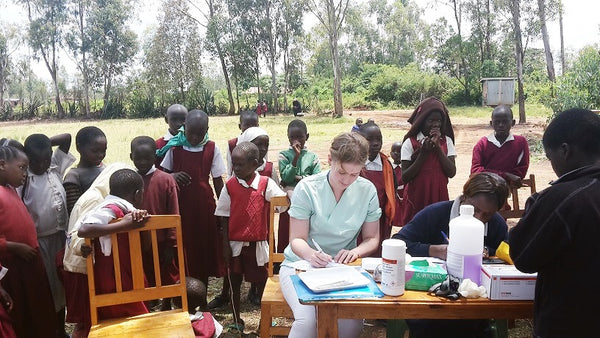
Contact/Organization:
www.dentists-for-africa.com
info@dentists-for-africa.org
When I packed my suitcase in mid-September, I didn't know what to expect on my trip to Kenya. Together with Kathinka, a dental student from Würzburg, and Dr. Ulrich Niemer from Münster, I set off on the long journey to Kenya. Our stay was organized by the organization "Dentists for Africa".
The aid organisation operates several dental stations in Kenya to improve dental care for the local population. The dental stations employ local staff who are regularly supported by German volunteers. The organisation is not only committed to the dental health of the Kenyan population, but also supports several social projects. One of these is the widows' village, where widows affected by the AIDS epidemic can lead self-determined lives. This involves the widows making jewellery and bags themselves, which are then taken back to Germany and sold there through the organisation. The money earned goes back to the widows. There is also the option of sponsoring a child through the organisation and paying for school and possibly university education. A meeting with the sponsored child is also possible at any time.
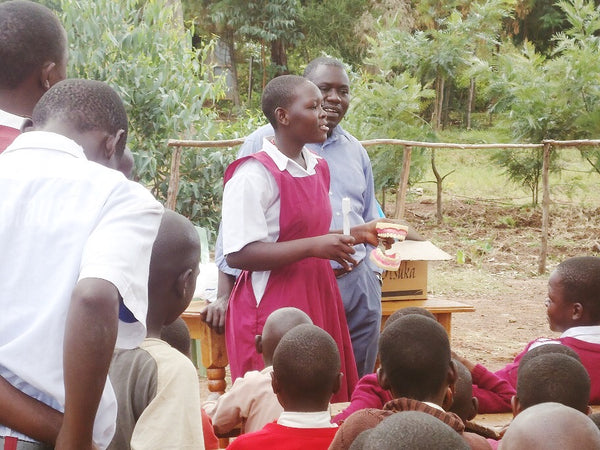
The organization's particular focus is on sustainability. This includes promoting dental training for orphans who would like to work in this field. This will enable the dental stations to gradually pass completely into Kenyan hands.
The flight to Kenya was very difficult for everyone involved. We flew from Frankfurt/Main to Addis Ababa, from Addis Ababa to Nairobi and finally from Nairobi to Kisumu. From there we were picked up by a driver from the organization and taken to our guesthouse in the village of Nyabondo, an hour away. With the flight and the drive to Nyabondo, I was on the road for almost 24 hours and was accordingly tired. But the next day we started our daily work routine.
On our first day at work, we got an overview of the hospital and our workplace, the Dental Unit. The initial chaos and the many materials that various dentists had brought back from Germany from time to time overwhelmed us a little. But little by little we tidied things up, we threw away old materials and cleaned our workplace.
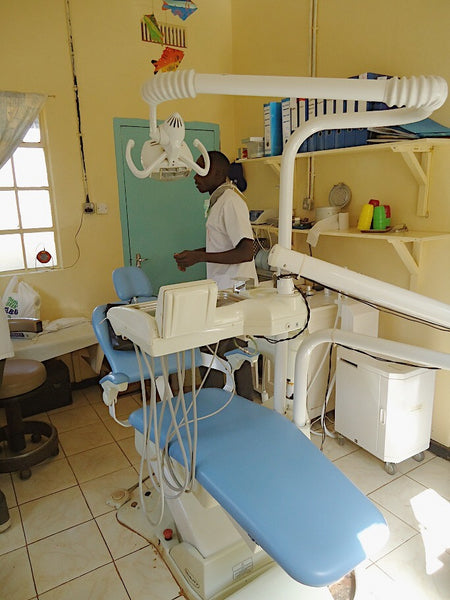
Our dental unit was simple but very well equipped. There are two consulting rooms. In the first consulting room, teeth cleaning and tooth extractions are carried out on a pump chair, and in the second consulting room, various treatments are carried out, such as plastic and amalgam fillings or root canal treatments. A few meters away there is a small dental laboratory in which interim dentures or complete dentures are made.
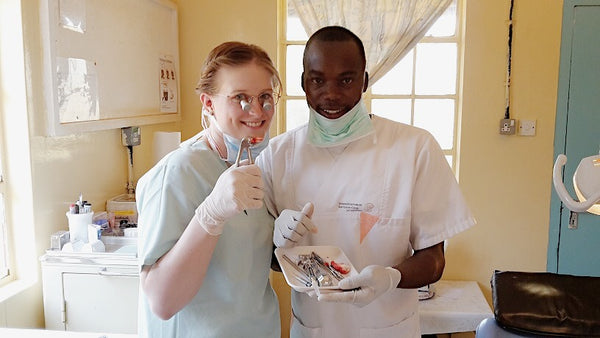
The team at the Dental Unit in Nyabondo consists of Alex, the Oral Health Officer (OHO), Beatrice, a dental assistant, and Dominic, the dental technician.
An OHO completes an accelerated course of study in dentistry, which qualifies him to place fillings or pull teeth. Alex is very skilled in his craft and for me personally, it was an enrichment to learn tooth extractions from him.
In addition to producing the dental work, Dominic was responsible for contacting the schools regarding the treatments and inviting them or driving to the school and examining the students and seeing what treatments were needed. The parents of the schoolchildren then fill out a kind of permission for the treatment and the students are then treated free of charge by the association.
On the very first day, a school class came to us for treatment and this continued for the entire two weeks in Nyabondo. The first few days I assisted Dr. Niemer with the fillings, then I was responsible for cleaning the students' teeth and extracting them. In between, a lot of patients in pain also came for tooth extractions. In total, I extracted around 100 teeth in the two weeks in Nyabondo.
In general, a large number of patients in Nyabondo have opted for extractions. Firstly, because awareness of one's own teeth and the importance of preserving one's own teeth is not as heightened as in Germany, for example, and secondly because tooth extraction is usually always the cheaper alternative. A tooth extraction costs the equivalent of three euros, a filling between five and seven euros, depending on the filling material. The most expensive thing is root canal treatment, which is therefore very rarely done. During our stay, regular dental work was also carried out, such as interim prostheses, which are usually intended to replace one or more teeth. If young Kenyans want to join the military, for example, they must have all 28 teeth. However, if a tooth has already been pulled, it must be replaced with a prosthesis.
During treatment, the power or the homemade suction system often failed. We were also unable to comply with the hygiene regulations that we know from Germany. Fortunately, however, we found a solution for every situation or simply waited until the power was working again. It is precisely these unforeseeable things that present an additional challenge, but they make working in Kenya unforgettable.
One day we drove to a school outside Nyabondo to carry out the examinations outdoors. As we passed the school in our car, many children greeted us, laughing and waving. Dominic gave a short introductory speech together with a prophylaxis lesson and then we assessed the children's findings. It was admirable how patiently the children stood in a line and waited for their examination, even though the sun was shining brightly and it was very hot. The oral hygiene of the pupils varied. Many had severe fluorosis, hard plaque on their teeth and deep caries. Other children, however, had very good oral hygiene.
The first two weeks in Nyabondo flew by for us. On Saturday we left the dental clinic there and went on a trip to the Masai Mara. This is a large nature reserve in Kenya. A few years ago an American built a lodge for tourists there and since then he has been offering not only accommodation but also trips through this nature reserve.
We stayed there from Saturday to Sunday and drove to the park with a driver on both days. We were able to see animals such as lions, giraffes, zebras and elephants. At night we slept in the tents of the lodge. A Masai told us that it often happens that a lion from the nature reserve gets lost in the lodge because the accommodation is not fenced in. Fortunately, we didn't see any lions at night.
On Sunday we went to our last stop in Asumbi and stayed there for a week to treat the school children and the pain patients.
Here, too, we lived on the grounds of the hospital, which, like in Nyabondo, was run by Franciscan nuns. The nuns were very warm and helpful. They visited us in the morning and evening and wanted us to feel comfortable with them at all times and to not lack for anything.
This dental station was managed by the dental technician Gladys, who is responsible for various prostheses, but also for tooth extractions and fillings. She is supported by the assistant Tabitha, who takes care of the sterilization of the instruments, among other things.
Kathinka and I then took turns either assisting Dr. Niemer or helping Gladys with the tooth extractions.
In general, Asumbi was very quiet in terms of the number of patients, as it is very remote. The next larger village was half an hour away by motorbike. For this reason, we had far less to do in Asumbi than in Nyabondo.
Of course, working in Kenya had other unusual downsides, besides the hygienic conditions and lack of electricity. In Nyabondo, work was very peaceful and without any major problems. In Asumbi, however, on the last day of work, a teacher from the nearest school came and brought a six-year-old student who needed to have a lower front tooth pulled. The girl was very afraid of the syringe and the forceps, so she screamed and fidgeted. The dental technician then held her down and the teacher started hitting the girl in front of me. Since my intervention in the situation was ignored, I wanted to get the girl's father involved. The father was very uninterested, however, and he told me that he didn't care what happened to his daughter. We should pull the tooth, no matter what the circumstances. This was a very shocking experience for me, and one that I had to think about a lot.
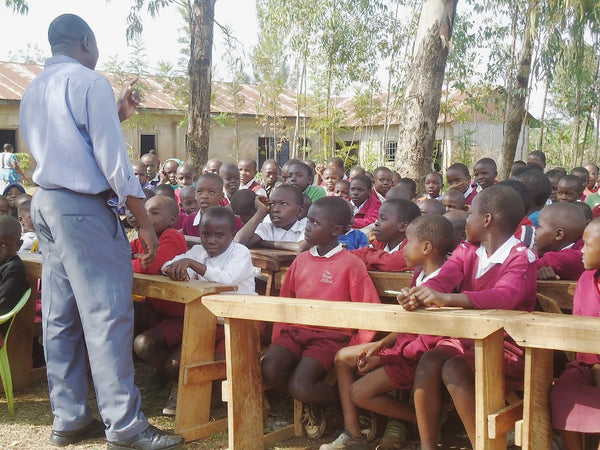
On the same day, after we had cared for all school children and patients, we left Asumbi for Kisumu and on Saturday we took our long flight back to Germany
It was something very special for me to immerse myself in African culture. People in Africa have a completely different mentality and way of life. They don't live by the clock, but with time. There is no such thing as stress or time pressure there. Our patience was often tested because our German mentality is deeply rooted in punctuality. But the patience and waiting were always worth it. We always got the answer "Hakuna Matata" (no problem) and a little "Hakuna Matata" in life is always good.
We were also very pleased with the hospitality and openness of the people. We were always invited to have a cup of coffee or a Coke with them. Or a priest friend invited us to his house for our last night in Kenya and he hired a catering service to feed us. We were very moved by the warmth and friendliness of the people.
Despite the great poverty that we saw and experienced in Kenya, the people there radiated so much joy for life and were very friendly and open-minded towards us.
Working in Kenya wasn't always easy and we had to give up a lot, but it was an unforgettable time for us. We collected wonderful impressions, made new friends and experienced unforgettable moments. This was definitely not my last stay in Africa.
By Kristin Kautsch (University of Göttingen), in Kenya
Period: September 2016















